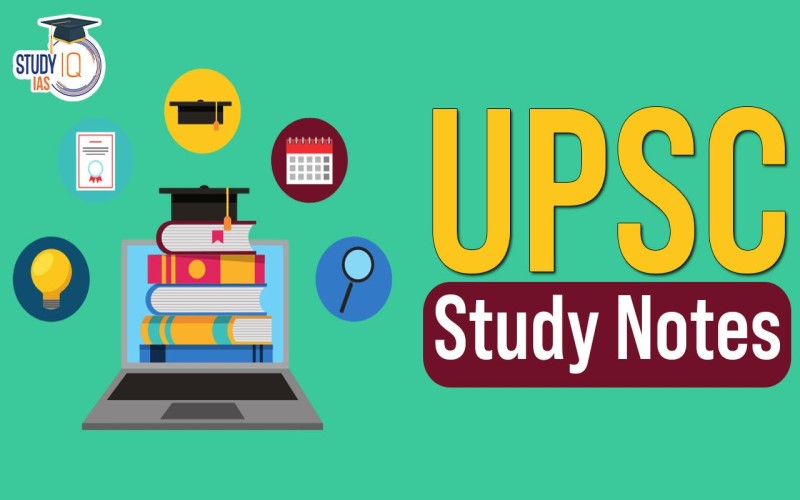There are three exams included in the UPSC examination: Prelims, Mains, and Interview. Each of the examinations demands strategy and deep knowledge of various subjects. So here are a few UPSC notes created for you with clear and concise information that will help you succeed in every examination. In this article, we will learn about detailed UPSC notes for both Prelims and Mains examinations.
Prelims Notes
Prelims Notes give a brief gist of the important concepts and facts required at the preliminary stage of competitive exams. They target basic fields like current affairs, general knowledge, and some simple concepts that turn into a ready references for revision.
General Studies Paper I
General Studies Paper I shall include Indian heritage and culture, history, and geography. The subject will include ancient and medieval history, modern history, and Indian and world geography—aimed at testing a candidate’s understanding of the quintessence of historical and cultural development in India.
| Subject | Syllabus |
| History of India and Indian National Movement | Ancient, Medieval, and Modern History |
| Important events, dates, and figures of the Indian freedom struggle | |
| Indian and World Geography | Physical, Social, Economic, and Geography of India and the world. |
| Key geographical phenomena and concepts | |
| Indian Polity and Governance | Constitution, Political System, Panchayati Raj, Public Policy |
| Important amendments, articles, and governance structures. | |
| Economic and Social Development | Sustainable Development, Poverty, Inclusion, Demographics |
| Key economic indicators and policies | |
| Environmental Ecology, Biodiversity, and Climate Change | Basic concepts, current issues, and conservation efforts |
| General Science | Basic concepts in Physics, Chemistry, Biology |
| Recent developments and applications in technology |
General Studies Paper II (CSAT)
General Studies Paper II, also known as CSAT (Civil Services Aptitude Test), evaluates candidates’ problem-solving abilities, analytical skills, and understanding of data interpretation. It includes questions on quantitative aptitude, logical reasoning, and basic numeracy.
| Subject | Syllabus |
| Comprehension | Reading and interpreting passages |
| Answering related questions accurately | |
| Interpersonal Skills including Communication Skills | Understanding and responding to various interpersonal scenarios |
| Logical Reasoning and Analytical Ability | Problem-solving techniques and logical deductions |
| Decision-Making and Problem-Solving | Approaches to handling administrative and situational problems |
| General Mental Ability | Numerical and analytical reasoning skills |
| Basic Numeracy and Data Interpretation | Understanding charts, graphs, and basic mathematical calculations |
Mains Notes
Mains Notes are detailed study materials designed for the main examination stage of competitive exams. They include in-depth coverage of various subjects, current affairs, and critical analysis, helping candidates develop comprehensive answers for essay and general studies papers.
General Studies Paper I
General Studies Paper I in the mains exam examines Indian and world history, culture, and geography. It assesses a candidate’s knowledge of historical events, cultural heritage, and geographical phenomena, focusing on their ability to relate these aspects to contemporary issues.
| Subject | Syllabus |
| Indian Heritage and Culture, History, and Geography of the World and Society | A detailed study of art forms, literature, and architecture |
| Comparative studies of world history and societal structures |
General Studies Paper II
General Studies Paper II assesses understandings of governance, constitution, polity, social justice, and international relations. It evaluates a candidate’s knowledge of administrative functions, legal frameworks, and global affairs, crucial for effective policy analysis and development.
| Subject | Syllabus |
| Governance, Constitution, Polity, Social Justice, and International Relations | In-depth analysis of constitutional provisions, governance mechanisms |
| Key international organizations and India’s role in global affairs |
General Studies Paper III
General Studies Paper III deals with technology, economic development, biodiversity, and security issues. It focuses on contemporary challenges and advancements in these areas, testing a candidate’s ability to analyze and address complex issues impacting national development.
| Subject | Syllabus |
| Technology, Economic Development, Bio-diversity, Environment, Security, and Disaster Management | Current advancements in technology and their societal impacts |
| Strategies for disaster management and national security measures |
General Studies Paper IV
General Studies Paper IV covers ethics, integrity, and aptitude. It assesses a candidate’s ethical reasoning, decision-making abilities, and understanding of the moral dimensions of governance and public administration.
| Subject | Syllabus |
| Ethics, Integrity, and Aptitude | Ethical theories and applications in real-life scenarios |
| Case studies highlighting moral and ethical dilemmas |
Optional Subjects
Optional subjects refer to specialized fields chosen by candidates for in-depth study in competitive exams. These subjects allow candidates to leverage their strengths and interests, providing an opportunity to gain a competitive edge in the examination.
| Subject | Syllabus |
| Choice of Optional Subjects | Strategies for selecting the right optional subject |
| Tips and resources for in-depth study and preparation |
Essay Writing
Essay writing involves crafting well-structured, coherent, and insightful essays on diverse topics. It tests a candidate’s ability to articulate ideas, present arguments, and analyze issues critically, showcasing their writing skills and depth of understanding.
| Subject | Syllabus |
| Approach to Essay Writing | Structuring essays, developing arguments, and presenting ideas coherently |
| Practice topics and feedback for improvement |
Interview Preparation
Interview preparation focuses on developing skills to effectively handle personal interviews during competitive exams. It includes mock interviews, communication techniques, and confidence-building strategies to help candidates present themselves clearly and persuasively.
| Subject | Syllabus |
| Personality Development and Mock Interviews | Developing a confident and balanced personality |
| Participating in mock interviews for better preparation |
Conclusion
Better UPSC exam preparation needs dedication, constant effort, and a planning strategy. These notes are customized to help you with IAS preparation and cover this broad syllabus efficiently and confidentially. Remember, the key to success lies in understanding concepts thoroughly, doing regular revisions, and practicing answer writing. Stay focused, and all the best for your UPSC journey!

